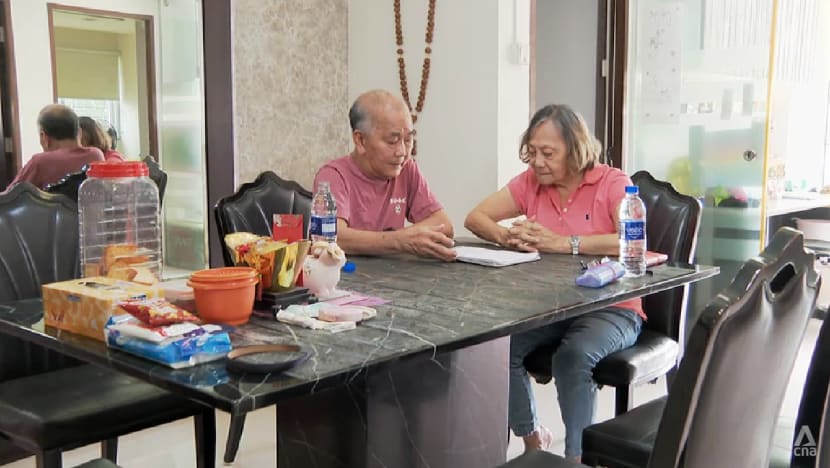Caregivers call for more support in looking after dementia patients amid rising stress, challenges
More than 100,000 people in Singapore are expected to suffer from dementia by 2030, up from just over 82,000 in 2018.

Mr Francis Leong is the main caregiver to his wife of over 50 years, who was diagnosed with dementia in December 2018. For him, the caregiving journey is not without challenges.

This audio is generated by an AI tool.
SINGAPORE: Mr Francis Leong is the main caregiver to his wife of over 50 years who was diagnosed with dementia in December 2018.
For him, the caregiving journey is not without challenges.
“It can be very tiring,” said the 80-year-old. “And, of course, from time to time, you can actually lose your temper,”
Facing such emotions is common among caregivers of people with dementia.
COPING WITH CAREGIVER STRESS
Caregivers are calling for more support to cope with burnout and rising costs.
This comes as more than 100,000 people in Singapore are expected to suffer from dementia by 2030, up from just over 82,000 in 2018.
There are many common sources of stress in caregiving, said Dementia Singapore’s care services director Stephen Chan.
“In order to support the person with dementia, it is equally important to support the caregiver as well," he said.
Often, when dementia gets worse with time, sufferers may lose their independence and the caregiving becomes “quite strenuous”, said Mr Chan.
“If the caregiver has burnout (and) doesn’t have the capacity to care, then very likely this person with dementia will end up in an institution,” he added.
“Caregivers may even suffer from depression, anxiety disorder and all these things due to caregiving.
“Caregiver burnout is quite prominent in any organisation that looks after a person with dementia. So we don't look after only the person with dementia, but it's actually the family, especially the caregiver.”
Related:
AVENUES OF SUPPORT
For those who need help looking after their loved ones with dementia, full-time residential care facilities are an option.
However, these facilities can cost anywhere between S$700 (US$530) and S$4,000 per month, depending on the amount of subsidies given.
Some caregivers may not be able to afford such services, and the lack of respite from caregiving duties can be damaging.
Caregivers are often “just thrown into a caregiving role” and typically, “there is really no training or knowledge about how to care for oneself”, said Dr Andy Ho, director of research at the Nanyang Technological University’s Palliative Care Centre for Excellence in Research and Education.
They may have to give up career opportunities or recreational activities as caregiving “requires their attention all the time”.
“(For) a caregiver who is dealing with demands and stress all the time, the body is constantly pumping out stress hormones,” said Dr Ho, adding that caregivers who are constantly under such stress may face headaches, migraines or other serious conditions such as stroke.
“In the short term, that will lead to these bodily symptoms that could be quite impactful and damaging. But in the long haul, it will lead to a continuous weakening of our immune system that can lead us to be much more susceptible to chronic conditions and diseases.”
MAKING ADJUSTMENTS
To prevent this, caregivers can look for other avenues of support, said observers.
These include dementia day care centres that offer respite to caregivers for a few hours. Their services are also heavily subsidised, which makes them affordable for most people.
At these centres, trained staff engage people with dementia through various activities such as games, arts and music. This allows their caregivers to go to work, run errands, or just take time off for themselves.
Some caregivers like Mr Leong have also joined support groups, where they share their experiences and lean on one another for support. They said a helping hand can ease the journey for people on a similar path.
"It's not easy, (it’s) easier said than done,” said Mr Leong, adding that adjustments had to be made in looking after a person with dementia.
“You have to remind yourself, it's not something that is so-called as per normal. So you have to remind yourself, I cannot react this way. (So there is a need) to do it differently, to take a step back.”
He added that caring for his wife is an act of service rooted in love, not labour.


















